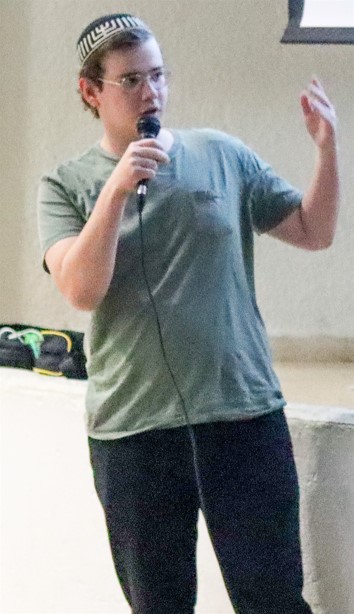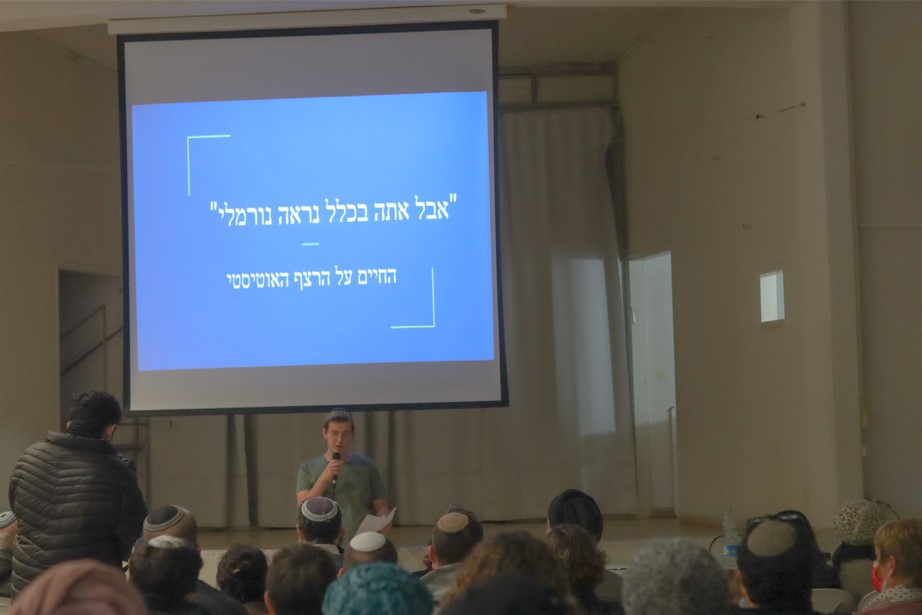"Autistic Is Not an Insult, It's My Life": An Inspiring Interview with an Autistic Teenager
Since being diagnosed with autism, Renan Dwolcki has shown the world that nothing is out of his reach due to his condition. In an inspiring conversation, he shares, "I have difficulties, but they don't prevent me from succeeding, being an instructor, and even studying for a bachelor's degree."

"My name is Renan Dwolcki, I am fifteen years old and live in Kfar Tavor. Since third grade, I have been diagnosed on the autism spectrum. Today, I am a youth movement instructor, a high school student at the religious school Shaked in Sde Eliyahu, and studying for a bachelor's degree at the Open University. I have two brothers and two sisters, and I am the second in the family."
With these simple sentences, Renan opens our conversation, making me wonder for a moment if I am indeed talking to an autistic teenager, as he presents himself. After all, he sounds normal in every way.
It seems Renan supposedly reads my thoughts. "When I tell friends that I have autism, they usually ask – 'What is it?' he says, "because although the word is known, it's usually not really understood. Some people associate it with mental retardation or strange individuals. Often, they ask me afterward: 'But how is that possible? You don't look autistic.' Sometimes I explain more, sometimes less. It depends on my patience, mood, and time."

"I Find It Hard to Understand Social Situations"
When I try to ask Renan how he was diagnosed with autism, he doesn't quite remember. "It was really a long time ago, but as my parents tell me – I was a very smart child, but with many social problems. They couldn't define or explain exactly what caused these problems. As a result, they took me to a psychologist, and that's where the whole process took place – I went to a series of orderly evaluations, and according to his impressions, he eventually gave the final diagnosis – high-functioning autism."
How does your autism mainly manifest?
"Autism is essentially communication problems," explains Renan, "and it manifests in that I am different from others when it comes to understanding social situations. For example, last year I started a new school – this is the high school I currently attend. Until the speech therapist pointed it out to me, I didn't think I needed to learn the names of the students in my class and grade. It's something that never crossed my mind. This is true for many other social topics."
But after you're explained the importance of things, do you understand them?
"As I said – my understanding is different, so sometimes I understand and sometimes I don't. I also have difficulty with self-advocacy – I can try to explain myself without any success, it's very hard for me to convey my feelings to others, and of course, regarding conversations with friends – I often find myself left out, struggling to integrate and take part in them."
Do you have good friends?
"Yes, I have a few friends, and I also manage to maintain good and logical relationships with them. But it's not easy at all and requires a lot of inner effort from me. Overall, I think I succeed."
Do these issues also manifest at home?
"Yes, but much less. Because, after all, I've been living with my siblings and family for 15 years, and at a certain point, I learned to know them and how to interact with them."
"There's Also an Upside to Autism"
What do you do to cope with autism? What mainly helps you?
"I don't like the term 'overcoming autism' because it sounds like it's a disease to overcome, and in any case, there's no real way to get out of autism. But if you are already autistic, you can teach yourself how to react in various situations and what's required of you. I don't think I'll ever react like a normal person with normal communication, but that doesn't really bother me. In the end, my only goal isn't to overcome autism but to make the most of it and understand how I can live with it while it bothers me as little as possible."
So does it bother you or not?
He ponders for a moment, then replies: "There are certain points in autism that bother me and are challenging, but there are also points where it actually helps me, and I relate to it. I can't say I'm happy with everything, or that I care and want to change everything. There are things I want to change and others I don't. I think that's how everyone feels about their nature, even if they're not autistic."
For example, what do you like about autism?
"I don't know if it's directly related to autism, but there are areas where I succeed more than others. For instance, I read books really fast. I read a page in an average book at a speed of about 40 seconds, and it's not that I skip words. I read every word and understand perfectly."
Is there a particular field you're especially interested in?
"There are many fields, mainly related to the Hebrew language. That's also why I manage 'HaTzitotea' – a WhatsApp group that sends an interesting quote once a day. I strive to keep up and send unique and inspiring quotes. I quote rabbis and leaders, sometimes heads of states and governments. We have about 500 members in the group, some from Israel and some from abroad.
"In addition, as I mentioned, I am studying for a bachelor's degree in political science through the Open University. I am the youngest in the group, but I don't see it as a problem. It's a topic that interests me, and there's no reason to delay starting a degree already at this stage."

"Remember That You're Capable of More"
And if all this isn't enough, Renan mentions that he is also an instructor at a youth movement and even delivers lectures on various occasions where he talks about himself and his autism. "The first time, it was really strange for me to stand in front of people and talk about myself," he admits, "I also didn't think it was that interesting. But after giving a few such lectures, I started to understand how important it is. It's important for people to understand what we – autistic people – go through. What bothers me most is hearing people use it as an insult. Even in the government, there was a Member of Knesset who called his opponent an 'autistic.' It doesn't offend me, but the term doesn't fit because an autistic person is not lacking, nor is it something insulting; it's just reality."
Do you have a message for others diagnosed with autism?
"My advice to those people is simply not to give up on anything. I would like to tell every child or teenager with autism to always remember that they can achieve much more than they think they are capable of."
And what message would you like to convey to the general population?
"If you have someone with autism around you, you should understand that they perceive the world differently and may behave differently, but at the end of the day, they are a person just like you. Give them the respect and appreciation they deserve, and under no circumstances should you distance yourself from them. Even if they have communication issues, they feel it in their heart when people avoid them, and it's unpleasant."

